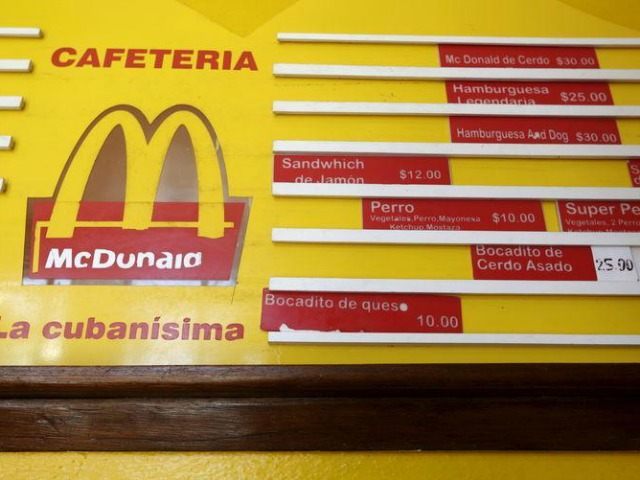A Reuters report takes a look at a new challenge facing the world of Cuba’s lax trademark enforcement: “normalization” of relations with the United States allowing American corporations to challenge copyright violations by small business owners using names like “McDunald” for their burger huts.
Understanding of copyright and trademark among regular Cubans is rare, Reuters reports, as the nation, for most of its existence as a communist dictatorship, has demonized the “petit bourgeoisie” and small business for profit, despite the fact that leadership of the Cuban revolution, Fidel Castro paramount among them, were members of the Cuban upper middle classes. In recent decades, the Cuban government legalized only 201 types of small business ownership, among them café and restaurant ownership. Reuters notes that the Cuban government does little to protect intellectual property in forms other than trademarks, such as film and music, and, in fact, “routinely pirates” American programming on its state broadcast.
That leaves business owners like Julio Manzini, who tells Reuters he had no understanding of trademark law before recently, vulnerable to lawsuits from corporations like McDonald’s. Manzini – who, being trapped on the island nation by its restrictive travel laws, has never tasted McDonald’s – nonetheless thought “Cafeteria McDonald’s la Camagueyana” was a catchy name for a business. His business changed its name to “Cafeteria la Camagueyana” (for its home province, Camagüey) after a visit from an attorney who “frightened” Manzini: “I don’t even pull in 1,000 pesos ($40) a day. … I just thought the name was striking, like Shakira or something.”
Cuba does have an Office of Industrial Property (OCPI), though Manzini tells Reuters he had no idea he was supposed to check with them before trying to use a name for profit. He is evidently not the only one, if the restaurant “McDonald” in Santa Clara, Las Villas state, is any indication:
Asi es el #McDunald en Cuba pic.twitter.com/VOIzSpAJCD
— Natural Brazil I&E (@NegociandoPa) January 12, 2015
American companies have shown renewed interest in doing business with the Cuban communist government since President Obama announced major concessions to the Castro regime in December 2014. The International Trademark Association encouraged corporations to register their trademarks with Cuba in April, noting that Cuban laws “allow global brands both to do business with the United States and protect their marks in Cuba without fearing penalties.” It adds, “Specifically, the regulations provide a general license to register and renew Cuban marks, receive those marks and prosecute and defend opposition and infringement proceedings.” Such registration, of course, comes with a price: a fee to the Cuban government.
Reuters notes that this has not deterred businesses like Coca-Cola, Levi’s, and Starbucks from registering trademarks with the Cuban government. Between January and April of 2015, 192 American trademarks were filed, more than double that of the entire previous year, the report adds.
Expecting this influx in trade curiosity, among the first laws the Cuban government passed following the “normalization” announcement in December was a regulation that forbids Cuban nationals working for foreign companies from keeping more than eight percent of their salaries. Using the weakness of the Cuban peso against the “convertible Cuban peso,” a tourist-only currency tied to the value of the dollar, Cuban nationals receive two Cuban pesos for every “convertible Cuban peso” they earn, allowing the government to pocket 92 percent of their paychecks.
International human rights groups have thus warned sternly against investment in Cuba, as it will likely embolden the Castro regime without significant improvement to the quality of life of the average Cuban. At a meeting of human rights advocates in late November, Forum for the Rights and Freedoms of Cuba representative Ayler González noted that most Cubans do not have expendable income: “There is no toilet paper, no oil. Cubans continue to live off of a ration book, vestige of the regimes of Eastern Europe.” González also noted, “With that notebook, every person receives 6 eggs a month.”
“Cuba is seeking subsidies because Venezuela is in freefall – looking for investment from the United States,” warned former political prisoner Pedro Fuentes Cid. “My recommendation to anyone who wants to do business, better to save your money in your pocket than invest in Cuba.”

COMMENTS
Please let us know if you're having issues with commenting.